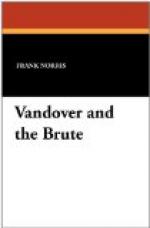Some time before there had come to him the idea for a great picture. It was to be his first masterpiece, his salon picture when he should get to Paris. A British cavalryman and his horse, both dying of thirst and wounds, were to be lost on a Soudanese desert, and in the middle distance on a ridge of sand a lion should be drawing in upon them, crouched on his belly, his tail stiff, his lower jaw hanging. The melodrama of the old English “Home Book of Art” still influenced Vandover. He was in love with this idea for a picture and had determined to call it “The Last Enemy.” The effects he wished to produce were isolation and intense heat; as to the soldier, he was as yet undecided whether to represent him facing death resignedly, calmly, or grasping the barrel of his useless rifle, determined to fight to the last.
Vandover loved to paint and to draw. He was perfectly contented when his picture was “coming right,” and when he felt sure he was doing good work. He often did better than he thought he would, but never so well as he thought he could.
However, it bored him to work very hard, and when he did not enjoy his work he stopped it at once. He would tell himself on these occasions that one had to be in the mood and that he should wait for the inspiration, although he knew very well how absurd such excuses were, how false and how pernicious.
That certain little weakness of Vandover’s character, his self-indulgence, had brought him to such a point that he thought he had to be amused. If his painting amused him, very good; if not, he found something else that would.
On the following Monday as he worked in the life-class, Vandover was thinking, or, rather, trying not to think, of what he had done the Sunday morning previous when he had gone to communion with Turner Ravis. For a long time he evaded the thought because he knew that if he allowed it to come into his mind it would worry and harass him. But by and by the effort of dodging the enemy became itself too disagreeable, so he gave it up and allowed himself to look the matter squarely in the face.
Ah, yes; it was an ugly thing he had done there, a really awful thing. He must have been still drunk when he had knelt in the chancel. Vandover shuddered as he thought of this, and told himself that one could hardly commit a worse sacrilege, and that some time he would surely be called to account for it. But here he checked himself suddenly, not daring to go further. One would have no peace of mind left if one went on brooding over such things in this fashion. He realized the enormity of what he had done. He had tried to be sorry for it. It was perhaps the worst thing he had ever done, but now he had reached the lowest point. He would take care never to do such a thing again. After this he would be better.
But this was not so. Unconsciously, Vandover had shut a door behind him; he would never again be exactly the same, and the keeping of his appointment with Turner Ravis that Sunday morning was, as it were, a long step onward in his progress of ruin and pollution.




